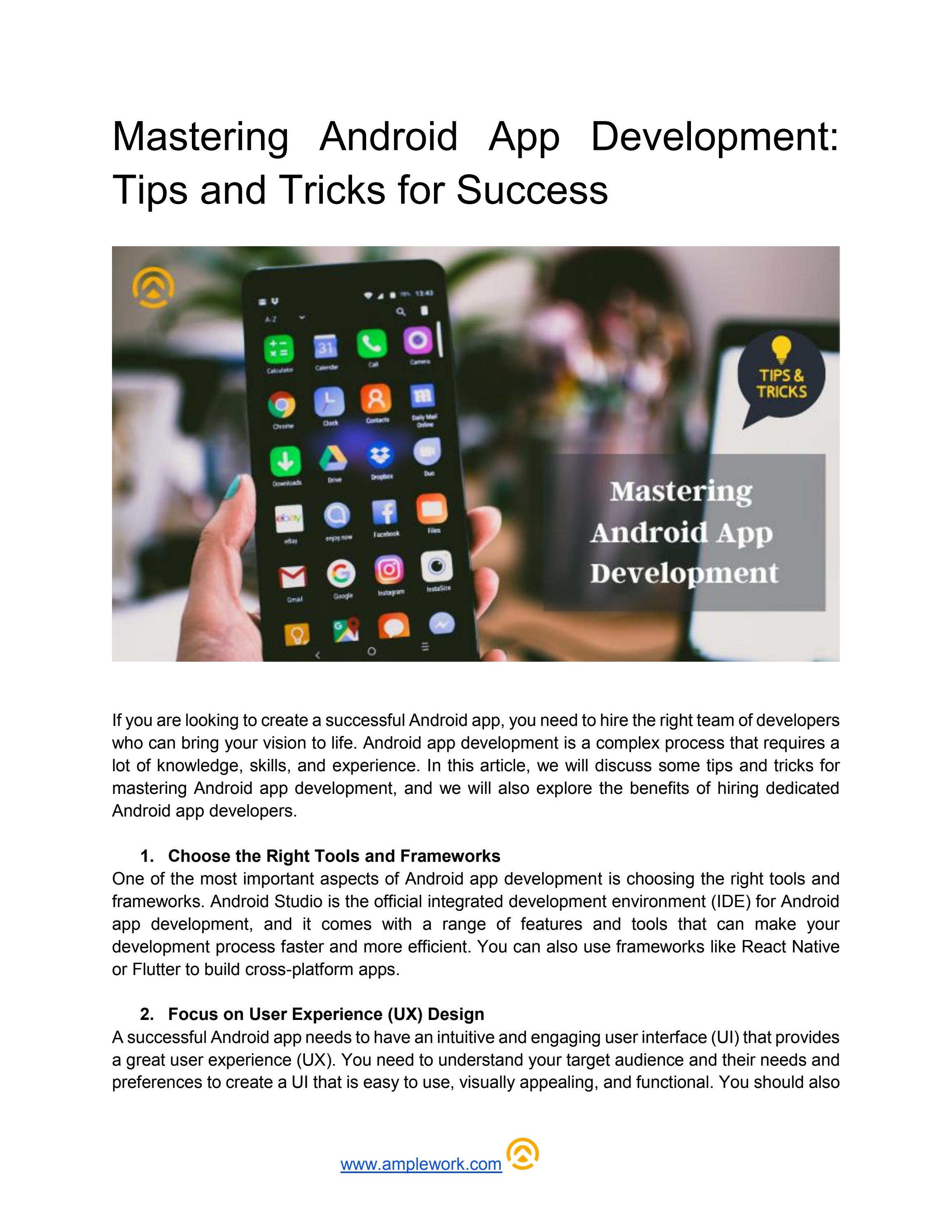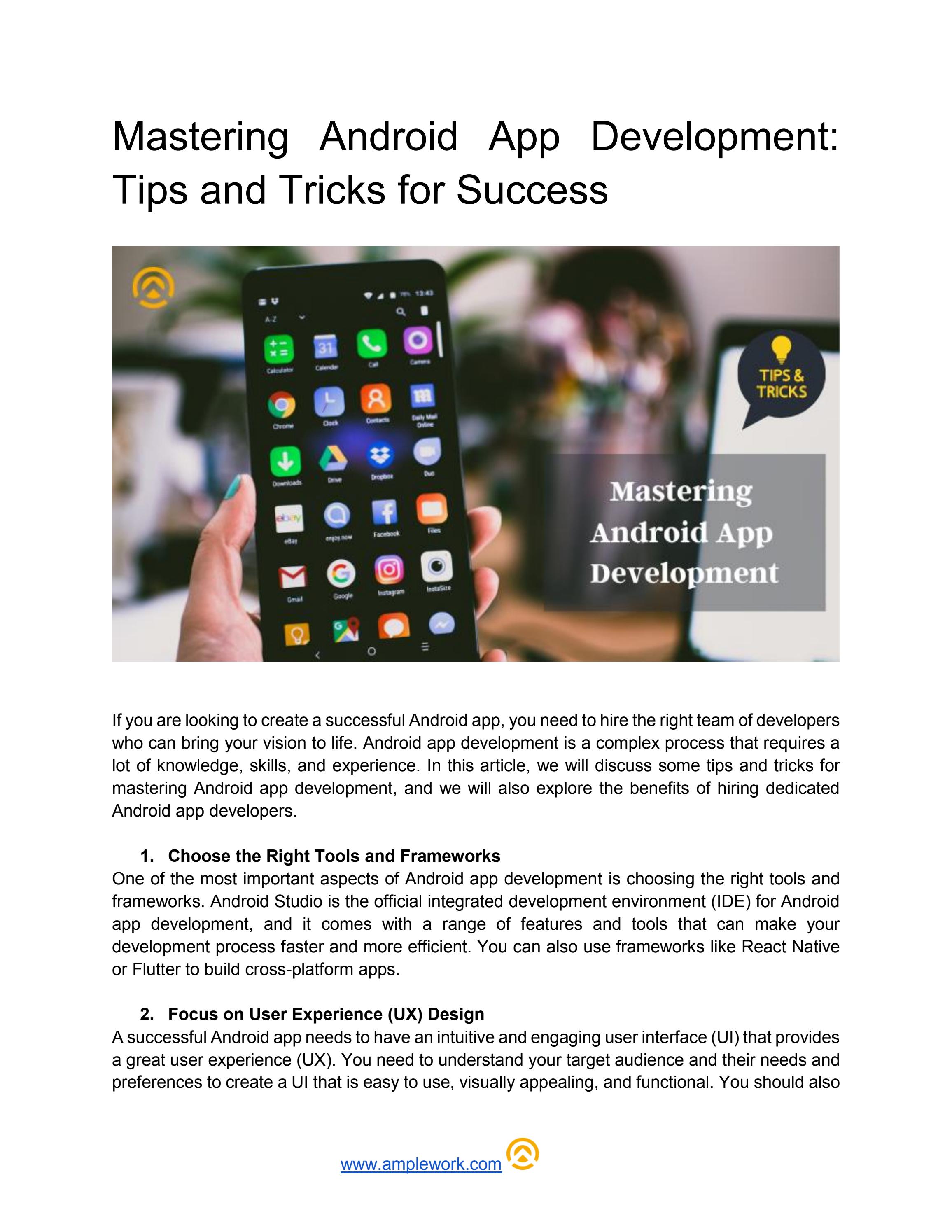Mastering app management is essential for any Android user who wants to ensure that their device runs efficiently. Closing apps is a key component of app management, but it can be tricky to do so in an efficient and effective manner. That’s why we’ve compiled a list of top tips for efficiently closing Android apps.
First and foremost, it’s important to understand that closing apps does not necessarily improve battery life or overall performance. In fact, constantly closing apps can actually be detrimental to your device’s performance. However, if you do need to close apps, the best way to do so is by using the app switcher. Simply swipe up from the bottom of your screen and swipe left or right to find the app you want to close. Then, swipe the app up and off the screen to close it.
Another tip for efficient app management is to use the built-in battery optimization settings on your device. This will help to conserve battery life and improve performance by limiting the resources used by certain apps when they are not in use. Additionally, consider using a third-party app manager to help you keep track of which apps are using the most resources and close them when necessary.
By mastering app management top tips, you can ensure that your Android device runs smoothly and efficiently, allowing you to get the most out of your mobile experience.. You may need to know : Mastering the Art of Closing Apps on Android: A Beginners Guide
As smartphone usage continues to rise, so does the number of apps available to download. Managing these apps can be a challenge, especially when it comes to closing them. In this blog post, we’ll explore the importance of Android app management, the different types of app management, and top tips for efficiently closing Android apps.
Table of Contents
Understanding Android App Management
Importance of managing apps
Managing apps on your Android device is important for several reasons. First, it can help you save battery life and improve performance. When apps are left running in the background, they continue to consume resources, which can drain your battery and slow down your device. Second, managing apps can help you stay organized and prevent clutter on your home screen. Finally, it can help you identify resource-hungry apps and take action to optimize their performance.
Different types of app management
There are several types of app management available on Android devices. These include:
– App permissions: This allows you to control what permissions apps have on your device.
– App notifications: This allows you to control which apps can send notifications to your device.
– App usage: This allows you to see how much time you spend on each app and take action to reduce usage if necessary.
Efficiently Closing Android Apps
Why closing apps is important
Closing apps on your Android device is important for several reasons. First, it can help you save battery life and improve performance. When apps are left running in the background, they continue to consume resources, which can drain your battery and slow down your device. Second, it can help you stay organized and prevent clutter on your home screen. Finally, it can help you identify resource-hungry apps and take action to optimize their performance.
Different ways to close apps
There are several ways to close apps on your Android device. These include:
– Swiping: This involves swiping the app off the screen to close it.
– Using the recent apps menu: This involves accessing the recent apps menu and swiping the app off the screen to close it.
– Using a third-party app manager: This involves using a third-party app manager to close apps automatically.
Best practices for closing apps
When closing apps on your Android device, it’s important to follow these best practices:
– Close apps that you’re not using.
– Close apps that are consuming a lot of resources.
– Don’t rely too heavily on task killers, as they can actually harm performance.
Tips for Mastering App Management
Organizing your apps
Organizing your apps can help you stay organized and prevent clutter on your home screen. To organize your apps, consider grouping them by category or frequency of use.
Identifying resource-hungry apps
Identifying resource-hungry apps can help you optimize their performance and improve battery life. To identify these apps, consider using the app usage feature on your device.
Using third-party app managers
Using third-party app managers can help you automate app management tasks and improve performance. Some popular third-party app managers include Greenify and AppMgr III.
Common Mistakes to Avoid
Leaving apps running in the background
Leaving apps running in the background can drain your battery and slow down your device. It’s important to close apps that you’re not using.
Over-reliance on task killers
Over-reliance on task killers can actually harm performance and reduce battery life. It’s important to use these tools sparingly and only when necessary.
Not updating apps regularly
Not updating apps regularly can lead to security vulnerabilities and performance issues. It’s important to update your apps regularly to ensure optimal performance.
Conclusion
Frequently Asked Questions
– **Saves battery life:** When you close apps that are running in the background, you conserve battery life and reduce the amount of energy your device uses.
– **Improves performance:** Closing apps can free up memory and processing power, allowing your device to run smoother and faster.
– **Enhances privacy:** When you close apps, you prevent them from continuing to access your personal information, such as location data or browsing history.
How can mastering app management improve the performance and battery life of my Android device?
– **Use app management tools:** Most Android devices come with built-in app management tools that can help you close apps efficiently. For example, you can use the “Recent Apps” button to view and close apps that are running in the background.
– **Uninstall unnecessary apps:** If you have apps that you don’t use, consider uninstalling them. This will free up storage space and reduce the number of apps running in the background.
– **Limit app notifications:** App notifications can drain your battery, so limit the number of apps that are allowed to send notifications.
Are there any risks or drawbacks to closing Android apps with app management?
– **May not improve performance:** Closing apps may not always improve your device’s performance, especially if you have a newer device with ample memory and processing power.
– **May cause app instability:** Closing certain apps may cause them to become unstable or malfunction. In some cases, you may need to restart your device to resolve the issue.
– **May affect app functionality:** Some apps rely on running in the background to function properly, such as music or GPS apps. Closing these apps may prevent them from working correctly.
Conclusion
Thanks for visits imagerocket.net for taking the time to read this article on mastering app management and efficiently closing Android apps. We hope that you have found the tips and techniques shared here useful in improving your device’s performance and maximizing your productivity.
As we have discussed, managing your Android apps can significantly impact your device’s speed, battery life, and overall functionality. By following the best practices outlined in this article, you can ensure that your apps are running smoothly and efficiently, without draining your resources unnecessarily.
Remember, it’s essential to regularly review and close any apps that you’re not actively using to optimize your device’s performance. By taking a proactive approach to app management, you can avoid common issues like app crashes and freezing, and keep your device running at its best.
In summary, mastering app management is a crucial skill for any Android user, and by implementing the tips and techniques discussed in this article, you can take your app management skills to the next level. So, go ahead and put these best practices into action, and enjoy a faster, more efficient, and more productive Android experience!



